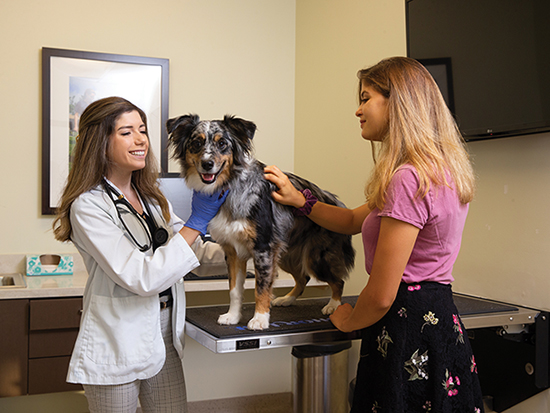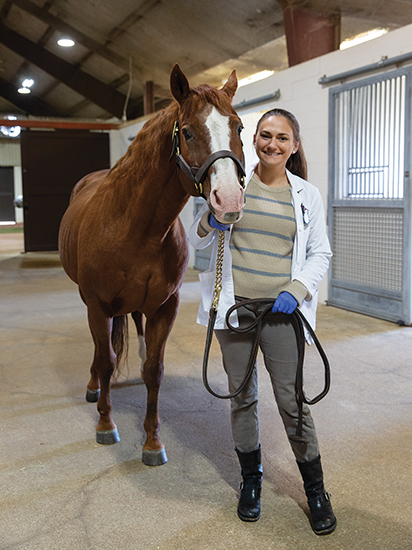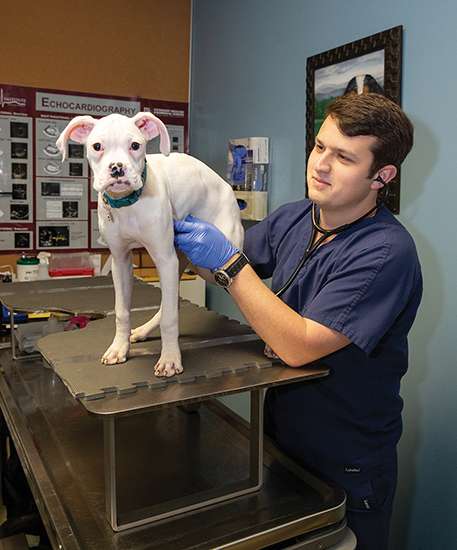Eyes On The Prize
Story by Dorian Martin
The majority of Texas A&M veterinary students go on to careers in general practice, but some become so enthralled with specific branches of medicine that they decide to dedicate their entire careers to that field.
Such is the case with Annalis Cigarroa, Maria Granello, and Hunter Enderle, who plan to take their professional aspirations to the next level after completing their Doctor of Veterinary Medicine (DVM) degrees by pursuing years of additional training and hands-on experience that will allow them to earn board certification in a high-demand veterinary specialty.
Becoming “boarded” in one of the American Veterinary Medical Association’s 41 recognized specialties means specialty candidates must complete a one-year internship and a residency program that can span up to three years; publish original research; and pass additional examinations.
This type of training substantially deepens the veterinarian’s knowledge and skill set. “I loved medicine since I was a child, but then I also figured out that I loved surgery in our junior surgery course. I didn’t want either of them to be exclusive,” Cigarroa said. “I think neurology is the perfect specialty that combines medicine and surgery. I also like that for a large portion of the patients we see, some of the surgeries truly can restore the animal.”

A Passion For South Texas
Cigarroa is proud of her hometown, Laredo, and that pride has influenced her decision to pursue a veterinary specialty.
“Laredo is a really unique city because there is such a blend of Mexican and American culture,” she said. “Everywhere you go, every restaurant and shop you walk into, you’ll be spoken to in English and in Spanish. As a result, there’s a Laredo accent, Laredo sayings, and other things that are just unique to border life.”
However, this booming city, which is the top trade port in the nation, has a healthcare deficit in specialty veterinary medicine.
“The closest specialty practice in South Texas is in San Antonio (more than 150 miles away),” said Cigarroa, who grew up with many foster pets and rode quarter horses in cutting events. “There are so many growing cities like Laredo, McAllen, and even Corpus Christi that don’t have close access.”
Cigarroa’s interest in medicine was piqued as a child by her father, who is a human cardiologist. “I always had a love for medicine,” she said. “It just wasn’t until later in my (undergraduate) studies that I decided it was a love for veterinary medicine and not human medicine.”
The fourth-year student, who entered the DVM program with a degree in science pre-professional from Notre Dame, hopes to combine her passion for animals, medicine, and the Texas border region to build a bilingual practice that specializes in small animal neurology in her hometown.
“I’m interested in bringing specialty medicine further into South Texas,” she said. “I hope within the next 10 years there can be a shift, whether that’s just providing some aspect of specialty care in South Texas or coming up with a way to bring specialty medicine in just one area and having it serve a greater population.”

Equine-imity
Horses are an integral part of Granello’s life.
As a young girl, she started competing in eventing, an equestrian sport similar to a triathlon, and then continued her passion as a member of the varsity equestrian team at Sewanee: The University of the South.
Now Granello wants to pursue a profession that will allow her to work with these animals—which has led her to commit to specializing in equine sports rehabilitation.
“I always want to keep horses in my life and then I found that veterinary medicine is a really great way to be engaged every day with both horses and the people who love and care for them like I do,” she said.
The native of Dallas, who holds an undergraduate degree in biology and a chemistry minor from Sewanee, believes the CVM’s program provided a solid and comprehensive veterinary foundation.
“Even though I’m an equine track, we get exposed to everything at A&M, which I think makes us more well-rounded,” she said. “But I have really enjoyed my time on the equine rotations.”
Granello has completed four rotations focused on horses and three externships at equine referral hospitals across the nation. The next step on her professional journey is an internship at the prestigious Littleton Equine Medical Center in Denver.
Afterwards, she plans to pursue either a surgery or sports medicine residency, which will prepare her to work with horses that are worth millions of dollars.
“I’m really interested in performance horses and helping these horses reach athletic and performance potential,” Granello said. “I really respect and am interested in how to improve and keep them at peak form.”
She credits Texas A&M for preparing her to be successful in this fast-paced and high-pressure setting.
“I think that the CVM’s professors and clinicians are very encouraging and they really want you to succeed in your goals and your career,” Granello said. “I have felt like everyone here wants the students to succeed and be the best veterinarians they can coming out of this program.”

Try, Try Again
Enderle’s path to a veterinary medicine career took an unexpected detour when his first application to the CVM wasn’t accepted.
“That was a little bit of a heartbreaker for me,” said the Midlothian resident, who earned a biomedical sciences degree from Texas A&M in three years. “It was my first defeat in life.”
His initial interest in a career in veterinary medicine had been fostered by his passion for several academic subjects.
“It was my interest in math and science and then my love of animals,” he said. “These two interests came together and formed this veterinary medicine career path.”
Enderle’s unexpected gap year resulted in valuable hands-on experience. Returning home to regroup, Enderle accepted a job as a technician at a Dallas-area specialty veterinary hospital.
Over the next year, he was introduced to a number of sub-specialties—including internal medicine, emergency medicine, and oncology—and had the opportunity to work with CVM associate professor Dr. Ashley Saunders, who offered cardiology consultations in the Dallas area.
That experience led to his acceptance to the CVM’s veterinary medicine program and the development of a mentor relationship with Saunders. It also helped him realize that he wanted to pursue a specialty.
“I knew in my first year of vet school that cardiac physiology clicked for me,” he said. “It just made sense and I was good at it. Having worked in the specialty practice, I was drawn toward the more specialized part of being good at one thing.”
Enderle believes earning board certification in cardiology will prepare him to be successful in the middle ground between medicine and surgery.
“The cardiologists do a lot of interventional procedures, so they’re closing off patent ductus arteriosus; they’re doing a noninvasive procedure to fix a dog’s heart from a disease it was born with,” he said. “But then cardiologists also work with a lot of medications and medicine management of really complicated congestive heart failure cases. They work with imaging like echocardiograms. You see a good variety, but you also get really good at the things that are common.”
Ultimately, Enderle wants to return to the Dallas-Fort Worth metropolitan area.
“Dallas is an underserved area for cardiology right now. I think there’s one cardiologist in the Dallas area,” he said. “For as many people that are there, it’s just not enough.”
###
Note: This story originally appeared in the Spring 2020 edition of CVM Today.
For more information about the Texas A&M College of Veterinary Medicine & Biomedical Sciences, please visit our website at vetmed.tamu.edu or join us on Facebook, Instagram, and Twitter.
Contact Information: Jennifer Gauntt, Director of Communications, Texas A&M College of Veterinary Medicine & Biomedical Sciences; jgauntt@cvm.tamu.edu; 979-862-4216


